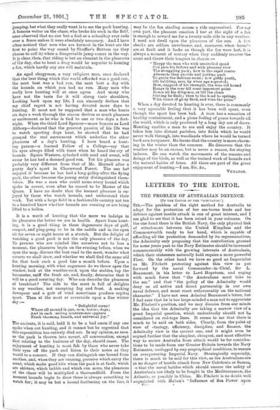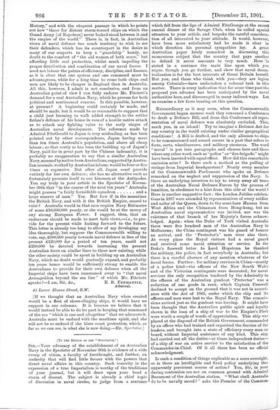LETTERS TO THE EDITOR.
THE PROBLEM OF AUSTRALIAN DEFENCE.
(To THE ED1T011 05 THE "SPECTATOR:1 Sm—The problem of the right method for Australia to adopt for the protection of her sea-borne trade and her defence against hostile attack is one of great interest, and I am glad to see that it has been raised in your columns. On the one hand there is the British Navy, the only physical link of attachment between the United Kingdom and the Commonwealth ready to her hand, which is capable of affording all the protection demanded by its representatives, the Admiralty only proposing that the contribution granted for some years past to the Navy Estimates should be increased commeasurably with the growing interests of Australasia, which their statesmen naturally hold require a more powerful Fleet. On the other hand we have so good an Imperialist as Mr. Fitchett protesting against this view as put forward by the naval Commander-in- Chief, Sir L. Beaumont. in his letter to Lord Hopetonn, and urging with much force that "the Australians must take to the sea" and that "the policy of the Admiralty would deny us all active and direct partnership in our own naval defence, and must react unfavourably on the national character." I have not seen Admiral Beaumont's letter, but I feel sure that he is too large-minded a man not to appreciate Mr. Fitchett's position, and we may dismiss from our minds the idea that the Admiralty are taking a narrow view of a great Imperial question, which undoubtedly should not be considered on red-tape lines. It seems to me that there is much to be said on both sides. Clearly, from the point of view of btrategy, efficiency, discipline, and finance, the Admiralty view is the correct one, and it might even be argued further that the simplest, cheapest, and most effective way to secure Australia from attack would be for contribu- tions to be made from our Greater Britain towards the Navy Estimates, unclogged by any geographical conditions, to ensure an overpowering Imperial Navy. Strategically especially, there is much to be said for this view, as the Australians ire in no danger of hostile attack from New Caledonia or. -Samoa, -o that the naval battles which should ensure the safety of Australasia are likely to be fought in the Mediterranean, the Atlantic, or possibly in China. Mr. Fitchett is no doubt -well acquainted with Mahan's "Influence of Sea Power .upon
History," and with the eloquent passage in which he point& out how "those far distant storm-tossed ships on which the Grand Army [of Napoleon] never looked stood between it and the empire of the world." There is, in fact, in Australian views of naval defence too much tendency to wish to see their defenders, which has its counterpart in the desire in many of our seaports to keep a " guardship " handy, no doubt to the comfort of " the old women of both sexes," but affording little real protection, whilst much impeding the proper distribution and combination of our naval forces. I need not labour the points of efficiency, discipline, and finance, as it is clear that one system and one command must be advantageous, while for a long time to come both ships and men are likely to be cheaper in England than in Australia. All this, however, I admit is not conclusive, and from an Australian point of view 1 can fully endorse Mr. Fitchett's demand for a real Australian Navy, which he presses for both political and sentimental reasons. Is this possible, however, at present? A beginning could certainly be made, and should be made, but it would be as reasonable to suppose that a child just learning to walk added strength to the settler father's defence of his house in case of a hostile native attack as to attach any fighting value to the early stages of Australian naval development. The reference made by Admiral FitzGerald to Japan is very misleading, as has been pointed out by other correspondents, Japan having more than ten times Australia's population, and above all cheap labour; so that costly as has been the building up of Japan's Navy, paid for in great part by the 'Chinese indemnity, it is probably no exaggeration to say that a similar Australian Navy, manned by native-born Australians, supported by Austra- lian arsenals, worked by Australian labour, would be four or five times as expensive. But after all, Japan must provide entirely for her own defence ; she has no alternative such as fortunately presents itself to our kinsmen at the Antipodes. You• say truly in your article in the Spectator of Novem- ber 30th that "in the course of the next ten years" Australia might possess "a fairly formidable squadron and a large reserve of men." Yes. But how if in the meantime the British Navy, and with it the British Empire, ceased to exist? Australia would in that case require Navy Estimates of some £10,000,000 yearly, or she would be at the mercy of any strong European Power. I suggest, then, that an endeavour should be made to meet both views,—i.e., to pro- vide for the present while looking forward to the future. This letter is already too long to allow of ray developing my idea thoroughly, but suppose the Commonwealth willing to vote, say, 2500,000 yearly towards naval defence in lieu of the present £120,000 for a period of ten years, could not 2250,000 be devoted towards increasing the present Australian force on similar lines to those now existing, while the other moiety could be spent in building up an Australian Navy, which no doubt would gradually expand, and probably ten years hence would be sufficiently strong to enable the Australians to provide for their own defence when all the Imperial ships have been summoned away to "that naval Armageddon beyond the sea line" of which Mr. Fitchett speaks ?—I am, Sir, &c., E. R. FREMANTLE, 44 Lower Sloane Street, S.W. Admiral.
[If we thought that an Australian Navy when created would be a fleet of shore-clinging ships, it would have no support in our columns. It is because we believe that it would instead be able to do its part in keeping that command of the sea "which is one and altogether" that we advocate it. Australia must be endued with the maritime spirit, and she will not be so endued if she hires coast protection, which, as far as we can see, is what she is now doing.—En. Spectator.]











































 Previous page
Previous page